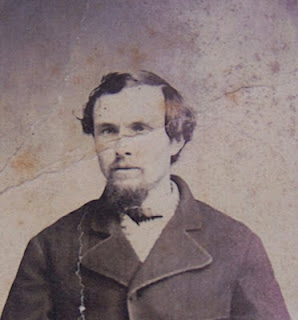We now finish up Chap 3. We'll be getting into some action pretty soon here. I just want to set the stage by working my way thru the journals.
Pay and Equipment
59
Keokuk
I feel quite unwell today, yet I drilled with the company. I ate no supper, thinking, perhaps, it would be better to abstain from eating for 2 or 3 meals. This is the first time I have felt unwell since I left home – (sweet home).
WEDNESDAY 19
Captain Ogg returned from Indianola & drilled us this forenoon.
I ate no breakfast this morning & now I feel a good deal better. I find it very inconvenient to be sick from home. And, I think, by good care of myself, I can preserve my health.
THURSDAY 20
This has been a very remarkable warm day. Notwithstanding this, we drilled as usual. I am perfectly willing to drill in warm weather, so I can stand the hot climate of the South, as we expect to be there soon.
I just remembered that this is my birthday. Oh, how quick the moments fly & how quick the years roll on. See page 129.
Keokuk June 20
Continued from page 59
This day I have reached the period of 24 years. It seems but a few months since I was but 15 years old. And, the years have passed so quick since I was 21 that I almost doubt whether it is so. Yet, it is undoubtedly the truth.
Many instances in my past life I have seen pleasure. Yet, far more numerous are the instances in my past life have I seen sorrow & trouble.
Would to God that I had to live my life over again knowing what I do know now. But, if I had to live it the same as I have done, I prefer letting it pass.
I should be more thankful to Divine Providence for that kind care which He has so long exercised over me, and, in return, for all His kindness. I have spent so many years in wickedness, yet, for the last 2 ½ years, I have tried to live the life of a Christian. And, oh, what poor success I have made. I, this day, ask the aid of Divine Providence
W.C. Newlon
60
I stood guard last night, & today I am on guard 2 hours & off 4 hours at a time.
Last night a disturbance arose between our company & company H. However, by the combined efforts of the city and military officers, the dispute was settled by forcing both companies to Quarters.
How remarkable dry and warm the weather continues.
Today the tents, guns & part of the uniform for the 3rd Reg. arrived. As soon as we are unified, I think we will be sent to Washington City , D.C.
May the difficulty be brought to a speedy settlement that my future destiny may be determined.
May I not be hasty & prepare to meet death at any time or place.
SUNDAY 23
I hail the glorious Sabbath morn, & it seems to me that I appreciate it more since in the service.
I attended Sabbath school at the United Presbyterian Church – quite interesting.
At I attended church at the same place. A well-delivered discourse by the Rev. Brown, long may I remember it.
At 2 I went to Sabbath school, M.E. Church
61
Keokuk
I have been very unwell today, not eating anything.
The Boys received their pay from the state for the time they were in the state service. The money was received like water to a thirsty man.
This evening my health is improving. I find that health is a great blessing when far from home. W.C.N.
TUESDAY 25
Keokuk
Today we received our guns. They are not the kind we expected, yet they’re new-improved muskets. Our regiment presents a different appearance. I feel a good deal more like a soldier.
My health is very much improved. I hope my friends enjoy the same blessing. W.C. Newlon
WEDNESDAY 26
Keokuk
Today we received our camp equipment & part of our uniform. At , we went into camp to strike the tents; Camp Kirkwood
At , we returned to town, all breaking ranks & running without orders through a very drenching rain.
62
This morning we took our baggage and went into camp. I feel happy to get out of town, thinking that I will have better health.
We are divided into squads of 3 in number. I feel thankful that I here have religious companions to mess with. We hold prayer in camp taking it by turns in making blessings of God.
FRIDAY 28
Camp [Kirkwood
Colonel Curtis arrived today; drilled us a short time, also giving orders for us to march in the morning to north Missouri
I got my first letter from home today. How glad I am to hear from home.




